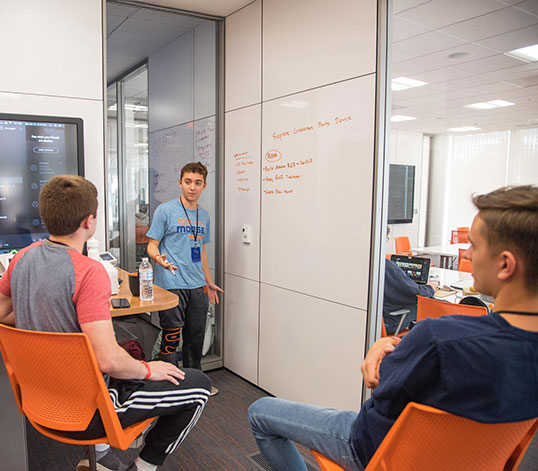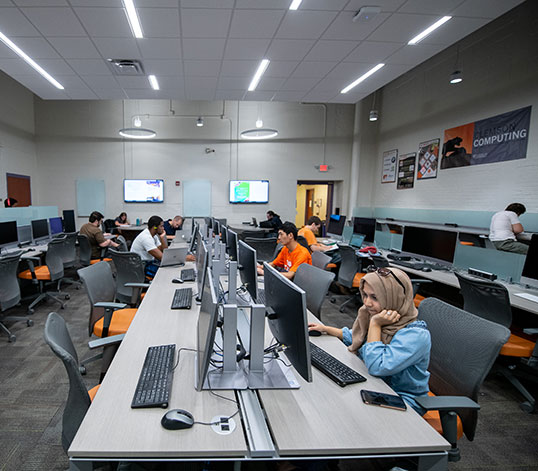New Student Information
Welcome to the Computing Undergraduate Program
From orientation requirements to laptop recommendations, you will find helpful information about getting started in your undergraduate program and preparing for your arrival in Clemson.
Please check out the helpful information in the drop-down list below and the New Student Next Steps checklist to prepare you for your first semester.



-
Orientation and Advising
New Student Orientation: Clemson provides a comprehensive new student orientation to introduce incoming students to campus life, resources, and traditions. During orientation, you will also get an introduction to the School of Computing (SoC), meet with a School of Computing advisor, and register for classes.
If you're not certain about which degree you want to pursue, discuss your interests and options with an advisor during the advising session. To make the best use of the session, have a list of interests, prior computing history and courses, and any information that you think would be helpful.
Transfer Students: Clemson offers a fantastic and comprehensive transfer student orientation that occurs before classes start. As part of the orientation experience, you will meet with a School of Computing advisor to go over your schedule and answer any questions you have regarding the academic programs.
Virtual Orientation: All incoming students are expected to navigate through our Virtual Orientation modules. You are expected to finish Module 2: "Academics," before meeting with an academic advisor. The remaining modules should be completed before starting your first semester.
Advising Preparation: Use Clemson's iRoar system to search for courses ahead of the advising session. If introductory courses are full, spots may open before the semester starts. During summer orientation, many departments hold back available seats for incoming students and release them in blocks throughout the summer. Your advisor will help you through the process during your orientation session.
- Curriculum Requirements: view curricula by program in the Clemson Catalog.
- Advising Worksheets: Once you complete Module 2 of the online orientation platform, an academic advisor will email you information about advising to your official Clemson email address, including an electronic advising form. Please make sure you check your Clemson email address at least once a day to stay on top of important advising information.
- Registrar Forms: change of academic programs (including declaring minors), academic forgiveness, and permission to take courses elsewhere (e.g., transient), are located on the Student Advising page.
-
Laptop Recommendations
Clemson requires all entering students to own a laptop; we recommend that you order by the end of July to ensure home delivery before you leave for Clemson. The cost of a laptop is automatically included in the cost of attendance for all entering first-year students and can be included for upper-level and graduate students upon request (a receipt may be required).
Clemson's Computing and Information Technology (CCIT) publishes information on laptop support and lists recommended laptop configurations for each fall. We strongly urge students to consider extended warranties for laptop purchases. Extended warranty coverage can help recover quickly through manufacturers' authorized service centers. Clemson's CCIT offers limited computer repair services and a loaner laptop program for certain laptops purchased through Clemson. About half of our students opt to purchase a laptop on their own.
School of Computing does not endorse a particular laptop model—our students use a mix of Windows, Mac, and Linux-based devices. All of these operating systems allow a Computing student to connect remotely to our systems. Please note that the required software may only be available for Windows or Mac in some cases. If you plan on developing iOS applications, Apple's Developer Guidelines specify that you must use a Macintosh-based computer to run the Xcode integrated development environment.
Which Laptop Should I Get?
One of the most common questions incoming students ask us is, "Which laptop should I get?" In addition to the information provided by CCIT, our recommendations stem from the experiences of systems support staff, faculty, and students of SoC who responded to a survey.
For most students, personal preference is a driving force when selecting a laptop, and SoC does not specify one particular model. Our students use a mix of laptops from different manufacturers spanning the major operating systems.
- Size and weight: Consider how you may use your laptop—in class, in your residence hall room, at the library, or in an auditorium. Generally speaking, larger laptops give you more usable screen real estate at the expense of being less portable. A smaller, lightweight laptop with long battery life is often a popular choice. A minimum display resolution of 1080p (1290x1080) is recommended; however, higher resolution displays provide a sharper image and may reduce eye fatigue.
- Processors: Most modern laptop processors (e.g., Intel i5/i7, Apple Silicon) are robust enough for the majority of programming assignments that School of Computing students will encounter during their tenure at Clemson. The School of Computing also provides 24/7 access to computer workstations in the McAdams Hall labs; selected CPSC-prefixed courses enrolled students are granted access to high-performance computing resources. Note: Snapdragon-powered Windows laptops may have issues with software compatibility.
- Operating Systems: Our students use a variety of Windows, Mac, and Linux-based devices, and all of these operating systems allow a School of Computing student to connect remotely to our Linux systems, as well as the Clemson CUapps remote Windows application system (although additional free software may sometimes be necessary). Note: Some required software, including exam proctoring software, is only available for Windows and macOS.
- Future Proofing: - While technology changes at a very quick pace, there are a few factors that can help you select a laptop that will extend its useful lifespan:
- Durability: Choosing a laptop that has a strong reputation for being long-lasting and can handle being hauled to class each day.
- Memory: Modern laptops do not allow you to upgrade the memory, so choosing a minimum of 16 GB of RAM is recommended.
- Storage: Like memory, storage can not generally be upgraded after purchase, so think carefully about how much space you need. We recommend 512 GB or more if you plan on installing multiple operating systems or keeping a lot of photos or videos.
- Warranties: Consider an extended warranty for your laptop purchase. An extended warranty can help you recover more quickly from an unpleasant experience through manufacturers’ authorized service centers.
- Power adapters: Consider purchasing a second power adapter for your laptop and keeping one at home and one in your bag. Not all classrooms have power ports at each desk, so you may need to find time to top off your laptop’s battery during the day.
-
Course Taken Elsewhere
Clemson's Office of Admissions maintains a Transfer Course Equivalency List, commonly referred to as TCEL, that allows you to search by institution to see if coursework has been previously evaluated as being equivalent to a course at Clemson. Individual departments are responsible for determining equivalency for coursework with their course prefix (e.g., the mathematics department evaluates all coursework containing the MATH prefix). If a course is not in TCEL or you believe TCEL to be inaccurate, you may contact the department responsible for evaluating the course. We strongly encourage you to provide a detailed syllabus for the course in question. A detailed syllabus typically includes the textbook used, a schedule of topics, and a reading calendar.
Computer science is a rapidly changing field. In order to ensure the quality and integrity of our program, the School of Computing may request to evaluate any computer science transfer coursework.
Request Approval
Connect
The advisor you are assigned in the School of Computing is determined by the degree chosen. Our FAQ Advising page lists area advisors, drop-in hours, plus general registering questions.
CCIT Support Center is located on the second floor of Cooper Library. They can assist with laptop and email setup, as well as ways to connect your gear to the Clemson network. You can also utilize the online chat feature to make a quick inquiry.
The Tiger Tech Shop, located in the Hendrix Student Center, allows you to buy Apple, Del, and Lenovo laptops and provides repair services.
School of Computing offers students opportunities beyond the classroom, from clubs to creative inquiry research. Additionally, you can visit the Student Affairs site to see more ways to get involved, find support, and utilize services.
